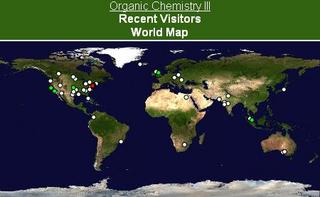Migration from F2F to online lectures
The press release mentions that they don't expect students to stop attending lectures if podcasts are made available. I would be very interested to see data on this as more universities offer lectures onlines.
What I found from my podcasting/screencasting pilot started in February 2005 with an online optional organic chemistry class is that by the last week of lectures only 10-20% of students attended lectures.
In the spring of 2005 the pilot was used as a template to apply to a few more courses. I was able to perform a more thorough analysis by taking daily attendance and plotting vs. RSS data obtained from Feedburner for two of the classes. The data show that:
1) Students who are going to subscribe to the podcast or blog feed for the class using RSS are going to do so within a few days at the start of class or will not do so at all. Instead of using RSS, the rest of the class go directly to the blog to view the screecast or download the mp3 files.
2) Students did not unsubscribe from the class blog after the class was over.
3) Two months after the class was over, RSS subscriptions doubled for one of the classes. Clearly there is demand out there for open content lecture recordings.
Here is a talk where I discuss these results.
The following plots were taken from two online optional Spring Term Organic Chemistry classes at Drexel. The classes run from day 1 to day 69. The % attendance was obtained from sign-up sheets at each lecture. The % subscribed was obtained from FeedBurner statistics and assumes that all RSS subscribers were students in that class. The spike from day 110-140 in the second class likely represents subscribers not at Drexel.
Here are details about how the podcasts and screencasts were made.







